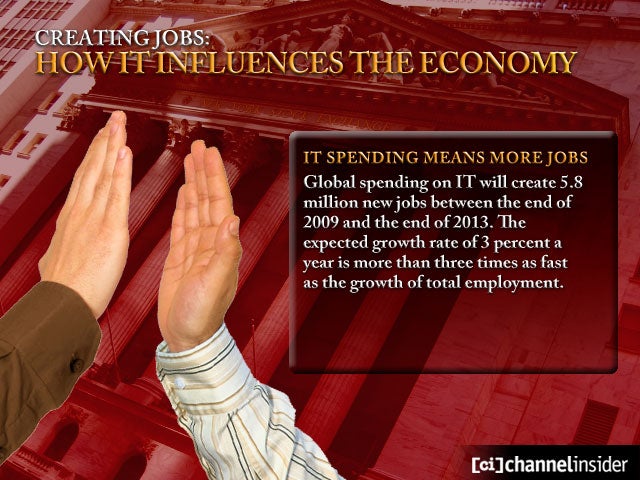 Creating Jobs How IT Influences the Economy
Creating Jobs How IT Influences the Economy
Global spending on IT will create 5.8 million new jobs between the end of 2009 and the end of 2013. The expected growth rate of 3 percent a year is more than three times as fast as the growth of total employment.
 No Title
No Title
IT spending is expected to grow at triple the rate of GDP growth in the 52 countries. Before we get too excited, IT spending forecasts have been dampened by the recession; however IDC predicts a steady 3.3 percent per year growth rate between now and the end of 2013.
 No Title
No Title
The study drills down on the market for Microsoft partners in particular. What IDC found is that for every single dollar Microsoft earns, its partners earn $8.70. IDC predicts that Microsoft’s partners worldwide will generate $537 billion in revenues for themselves in 2009 alone, with $183 billion of that coming from North America.
 No Title
No Title
Spending on software is growing faster than spending on IT in general – 4.8 percent a year between 2008 and 2013, compared with 3.3 percent for all IT spending. Total IT spending comprises sales of hardware, software, services and data networking expenditures by consumers, businesses, governments and educational institutions.
 No Title
No Title
During 2009, total IT employment in the 52 countries in the study dropped a fraction of a percentage point, yet software-related employment grew 4 percent.
 No Title
No Title
The IT market will create more than 75,000 new businesses over the next four years, according to the study. Most of the new companies will be small and locally owned organizations as IT professionals that have lost corporate jobs decide to hang their own shingles.
 No Title
No Title
IDC estimates that cloud services could add $800 billion in net new business revenues between the end of 2009 and the end of 2013. That’s a massive figure and represents an enormous opportunity for solution providers if they can figure out where they fit best in the cloud-computing model.

